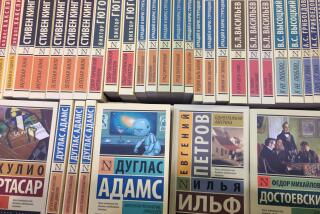A GLOSSARY
- Share via
MOSCOW — The ascension of Mikhail S. Gorbachev as Soviet leader has led to wide international understanding of the Russian words and terms he has popularized to explain his new program.
In the worst days of the Cold War in the 1940s and 1950s, perhaps the Russian word most widely known by foreigners was nyet, meaning no and symbolizing Soviet rejection of Western proposals.
Now, however, better communication and Gorbachev’s attempt to revitalize his country have led to greater awareness of key Russian phrases he frequently employs.
Perhaps the best-known examples are glasnost and perestroika, pronounced millions of times by him and others since he moved into the top Kremlin post in March, 1985.
Glasnost is usually translated as openness but a dictionary published in Moscow defines it as publicity, or public airing. Perestroika has several meanings in the dictionary put out by Russian Language Publishers in its Russian-English edition. The first definition is rebuilding, followed by reconstruction, which is perhaps the most commonly used word for the thrust of Gorbachev’s program. It connotes reform as well as reorganization.
Other common words in Gorbachev’s glossary: Uskorenie , less frequently heard now than in the early days of Gorbachev’s leadership, means acceleration or speeding up. It has received less emphasis, perhaps, because it is difficult to combine the concepts of going faster as the economy and society make a sharp turnaround.
Democratsia , the Russian word for democracy, fills the air in Moscow these days. Gorbachev usually reminds his listeners, however, that he’s talking about socialist democracy rather than the Western model. In his usage, the term refers to more participation by workers in choosing leaders of state-run enterprises and experiments with allowing more than one candidate to run for each office.
Noviye myshleniia is a phrase which literally means new thinking, and Gorbachev uses it to describe changes he advocates in Soviet attitudes on both domestic and international issues. Under this rubric, for example, he contends that it’s not possible to oppose perestroika or to champion the concept of nuclear deterrence. But it also encourages consideration of alternatives that were once considered unacceptable in the Soviet mindset.
Trezvost norma zhizni , the motto of the government’s anti-alcohol campaign, means sobriety is the norm of life. Gorbachev’s campaign to raise prices and reduce supplies of vodka has run into strong opposition and spurred the production of home-brewed liquor, known as samogon . The campaign has created long lines in front of Moscow’s liquor stores but little enthusiasm for the newly created sobriety society.
Neo-globalism , a new Kremlin pejorative, partly replaces imperialism in the anti-West lexicon. It is invariably employed to express the oft-heard view that the United States, particularly the Reagan Administration, is seeking to project its power around the world by military or economic means.
More to Read
Sign up for Essential California
The most important California stories and recommendations in your inbox every morning.
You may occasionally receive promotional content from the Los Angeles Times.









